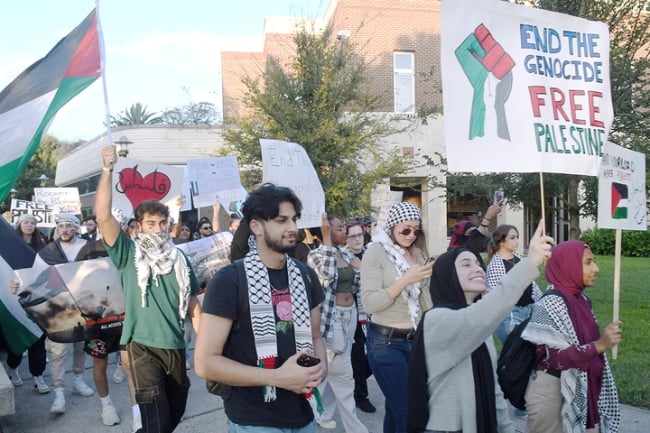You have /5 articles left.
Sign up for a free account or log in.

Pro-Palestinian students march on Oct. 13 at University of Central Florida, which does not have an SJP chapter.
Paul Hennessy/Anadolu via Getty Images
The head of Florida’s State University System has ordered the campus chapters of Students for Justice in Palestine to shut down, according to an Oct. 24 letter to the system’s presidents from Chancellor Ray Rodrigues. The directive, he wrote, was issued “in consultation with Governor DeSantis.”
The letter says it is a felony under Florida law to “knowingly provide material support … to a designated foreign terrorist organization” and that the national SJP “has affirmatively identified” with Hamas’s Oct. 7 terrorist attack on Israel.
Rodrigues cites SJP’s Day of Resistance Toolkit, a document outlining advice and tips for campus chapters planning to host protests in support of Palestinians. The toolkit identifies Hamas’s attack on Israel as “the resistance” and, in a section advising SJP chapters on how to frame discussions about the conflict, states, “We as Palestinian students in exile are PART of this movement, not in solidarity with this movement.”
The United States identifies Hamas as a terrorist organization.
The directive applies only to the institutions in the state university system, not those overseen by the Florida Department of Education. According to Rodrigues, two State University System of Florida institutions have SJP chapters. The letter advises the universities to allow students in those clubs to form new student groups that comply “with Florida state statutes and university policies” and to “grant these two chapters a waiver for the fall deadlines, should reapplication take place.”
Rodrigues’s letter comes more than two weeks into the war between Israel and Hamas, which the Associated Press reports has resulted in 1,400 Israeli and at least 6,456 Palestinian deaths. Since the beginning, the war has been a hot-button issue on college campuses, starting with controversy over the statements many pro-Palestinian student groups made about the Oct. 7 attack, which many viewed as insensitive to the Israeli citizens who were killed. Since then, tensions have run high between Palestine and Israel supporters, with some universities attempting to bridge the gap.
(This is a developing story.)




